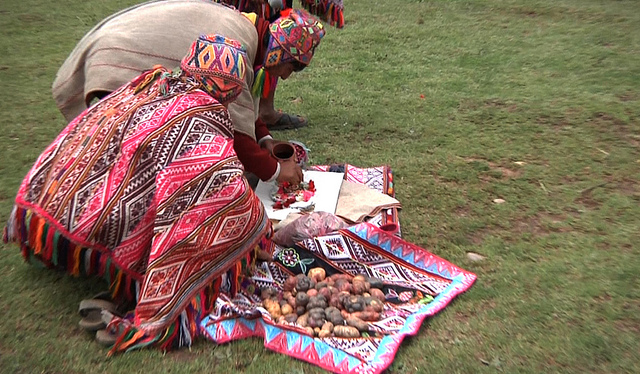
Earlier this year, the Quechua People in the Peruvian state of Cusco, launched an ambitious plan to send 1,500 varieties of Potato to the Svalbard Global Seed Vault in the Arctic Circle. It was first time Indigenous Peoples ever contributed to the underground vault, which already houses more than 90,000 seed samples from around the world.
Exactly one month after the donation was announced, on April 15 “Peruvian President Alan García signed a decree allowing the import and planting of genetically modified organisms (GMOs) in the country,” explains Amberly Polidor in a news briefing for the Sacred Land Film Project (SLFP).
The official decree puts at risk the genetic diversity of the Peruvian Andes, including the tuberous crop we know as potato.
The fourth most important crop in the world, Potato was first domesticated in Peru about 10,000 years ago. And while western households may take them for granted, they are now inextricably tied to Quechua identity, much like corn to the Maya or Reindeer to the Saami, as the 13-minute documentary “The Potato Park / Parque de la Papa” shows.
“Cusco is the center of origin of the potato, with the highest diversity of potato varieties found anywhere in the world. As guardians of the potatoes, Andean communities have, within challenging political contexts that favor international commercial interests, fought to protect their biocultural heritage. These actions have been supported by local governments, such as the Cusco regional government, and have led to five regions producing decrees that prohibit the use of GMOs … All that has been accomplished over the last 10 years of actions against GMOs in order to protect Peru’s high-quality natural, non-GMO crops is now being threatened,” Alejandro Argumedo of ANDES said in an email message to SLFP.
Last week, opponents of the decree converged in Lima to protest. “Many opponents argue that the country hasn’t conducted enough research and development in the field, and they are asking for a 15-year moratorium on GMOs, to give Peru more time to build the research infrastructure needed to fully assess and make the best decisions on the use of GMO crops,” Polidor explains.
“Peru’s Congress is expected to discuss just such a moratorium in a new proposed bill. Meanwhile, Peru’s Minister of Agriculture Rafael Quevedo recently resigned in the heat of criticism over his support of GMO crops and his position as director of a company that uses them,” she continues.
Of course, Potatoes and GMOs aren’t the only concern in the Peruvian Andes. As Polidor also points out, leaders from the Quechua community of Q’eros recently ” blocked geneticists from collecting DNA samples from their community as part of National Geographic’s ongoing Genographic Project, which has been gathering DNA from people around the world.”
The Genographic Project, which aims to “collect, analyze and store 100,000 DNA samples of Indigenous peoples worldwide to study human origins and migrations” has been long viewed with suspicion and mistrust by Indigenous Peoples.
If the Genographic Project hadn’t already earned that very suspicion and mistrust, they have now. An expedition team was planning to arrive in Peru on May 7 to begin collecting samples from the Q’eros. “The Q’eros — who are the subject of a segment in Sacred Land Film Project’s upcoming film Losing Sacred Ground — are a traditional, shamanic people who self-identify as the “last Inca,” says Polidor.
She goes on to say,
According to a communique from the Asociación para la Naturaleza y el Desarrollo Sostenible (ANDES), a Cusco nonprofit, the U.S.-based project did not consult with local or regional authorities; rather, a local guide hired by the project sent only a one-page letter to the communities announcing the upcoming visit.
The letter, released by ANDES, invited families to come to a “fun” presentation on the study, which would include “a projector and pretty pictures,” in an effort to encourage them, young and old alike, to offer their DNA samples. “The benefit,” the letter said, “is that the people of Q’eros can know their ancestral roots … You can learn about your origin from centuries and centuries ago.”
Benito Machacca Apaza, president of the Hatun Q’eros community, responded in an ANDES press release that, “The Q’ero Nation knows that its history, its past, present, and future, is our Inca culture, and we don’t need research called genetics to know who we are. We are Incas, always have been and always will be.”
A Q’eros delegation brought their concerns to officials in Cusco, who ultimately agreed with them– according to ANDES, marking the first occasion that a local government in Peru applied an ordinance “in defense of its citizen’s genetic integrity.” The officials said that the GP expedition had violated a local ordinance on biological diversity that requires notarized evidence of informed prior consent, along with other documents, before collecting DNA, Polidor explains.
Following the decision, the Genographic Project cancelled their visit until they can “find out exactly what happened.”

Indigenous Peoples are putting their bodies on the line and it's our responsibility to make sure you know why. That takes time, expertise and resources - and we're up against a constant tide of misinformation and distorted coverage. By supporting IC you're empowering the kind of journalism we need, at the moment we need it most.